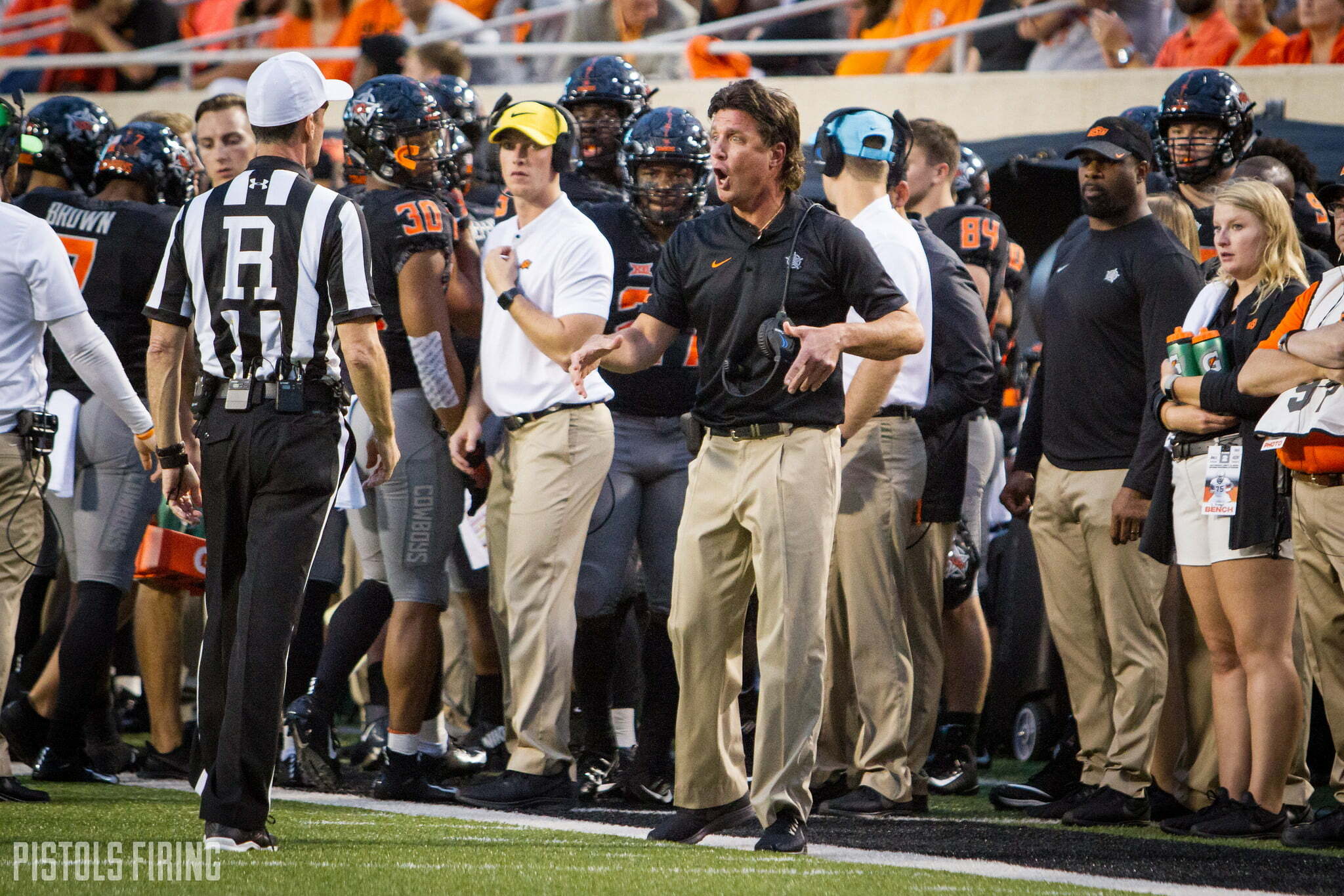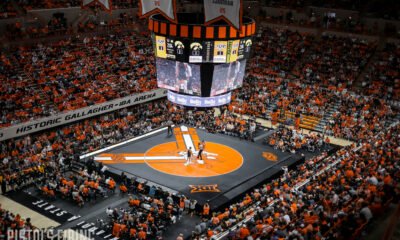Football
Can Mike Gundy Reach 200 Career Wins?
Only 18 CFB coaches in history have ever done it.

In the history of college football, only 18 coaches have ever won 200 or more games. Only three coaches have ever won 300 or more. And only one has ever eclipsed 400.
Here’s a look at the list, which I pulled from CFB Reference (I think it’s important to note that they only include coaches from programs that were considered major schools at the time when the coach was there — here is their definition of a major school).
| Rank | Coach | Wins | Primary School |
|---|---|---|---|
| 1 | Joe Paterno | 409 | Penn State |
| 2 | Bobby Bowden | 357 | Florida State |
| 3 | Bear Bryant | 323 | Alabama |
| 4 | Pop Warner | 311 | Carlisle |
| 5 | Amos Alonzo Stagg | 282 | Chicago |
| 6 | LaVell Edwards | 257 | Brigham Young |
| 7 | Tom Osborne | 255 | Nebraska |
| 8 | Lou Holtz | 249 | Notre Dame |
| 9 | Frank Beamer | 238 | Virginia Tech |
| 9 | Mack Brown | 238 | Texas |
| 11 | Bo Schembechler | 234 | Michigan |
| 12 | Hayden Fry | 230 | Iowa |
| 13 | Steve Spurrier | 228 | Florida |
| 14 | Nick Saban* | 225 | Alabama |
| 15 | Bill Snyder* | 211 | Kansas State |
| 16 | Woody Hayes | 205 | Ohio State |
| 17 | Don Nehlen | 202 | West Virginia |
| 18 | Vince Dooley | 201 | Georgia |
*Active coaches
Mike Gundy slides in at 121st on the list with 116 wins in his 14 years on the job in Stillwater. You start getting into that territory, though, and it becomes easier and easier to move up the list. For example, if OSU goes 9-4 this year including a bowl win, Gundy will end the season ranked around No. 105. If he wins 18 times over the following two years, he’ll be into the top 80 or so.
Think about this. Les Miles has 142 wins. Gundy needs just 26 wins to catch the man he replaced in Stillwater. Who, back in 2005, would have ever considered that a possibility?
As I perused the list, I started wondering how feasible it was for Gundy to sniff 200. We’re talking about rarefied air. Urban Meyer needs 21 wins to get to 200. He’ll likely be the next to cross the Mendoza Line. After that, Mark Richt needs 35, and Gary Patterson needs 38.
The primary trait needed to reach 200 is obviously longevity. It’s essentially 20 years of winning 10 games a season. Or 25 years of winning eight a season. A quarter of a century of consistently being really good at college football or a fifth of a century of being great. Either way, it’s really, really difficult. Even though it’s getting easier as college football seasons get longer, there’s a reason only 18 men have crossed over into that territory.
So what does Gundy have to do to get there? I took his average wins number since 2010 — I think we can all agree that for better or worse, OSU has been what it will be under Gundy since 2010 — and divided the number of wins he needs to get to 200 (currently 84) by that number.
Gundy is averaging 9.75 (!!!) wins per season since 2010, which means he would have to coach basically nine more seasons (with a little wiggle room) at the same clip to get to 200. That seems … actually kind of possible.
I know Gundy has always talked about not coaching until he’s 70, and I don’t think he will. But nine years from now he will only be 60. I’ve said he won’t coach until then, but I do wonder if he’ll find that running the backhoe in the middle of October ain’t what it is in the middle of May.
Wouldn’t that be something, too?
By my count, there are eight coaches ahead of him who could get there before him. Urban (lock), Patterson (probably a lock), Richt (probably a lock), Kirk Ferentz, Brian Kelly, Mike Leach, Chris Petersen and Bobby Petrino. Paul Johnson, Frank Solich, Rocky Long and Mark Dantonio are also ahead of him, but they’re all much older and seem like fairly improbable candidates to reach 200.
Behind Gundy, Kyle Whittingham, Bronco Mendenhall and Dabo Swinney are the only real contenders to get to 200 that are currently within striking distance of his 116 victories.
Again, these are current coaches. If Bob Stoops (who only needs 10 wins to get to 200) comes out of retirement, all bets are off.
So maybe Gundy makes a little history and becomes the 23rd or 25th coach in college football history to win 200 games (and does it all at OSU). Or maybe he retires and wins multiple peacock breeding competitions in the age 55-70 division. I have no idea. The fact that this is even a question at all, though, is a testament to the monster he’s built in Stillwater, USA. Now he just has to keep feeding it.

-

 Football2 days ago
Football2 days agoOklahoma Transfer Gavin Freeman Commits to Oklahoma State
-

 Wrestling1 day ago
Wrestling1 day agoOSU Wrestling: 2020 Olympic Gold Medalist David Taylor Named Head Coach of Cowboy Wrestling
-

 Football4 days ago
Football4 days agoReport: Cornerback Jordan Reagan Enters Transfer Portal
-

 Softball3 days ago
Softball3 days agoOSU Softball: Cowgirls Secure Bedlam Series Win with 6-2 Victory against Sooners






